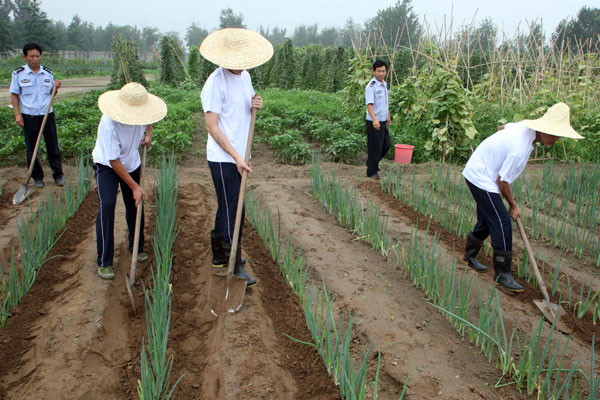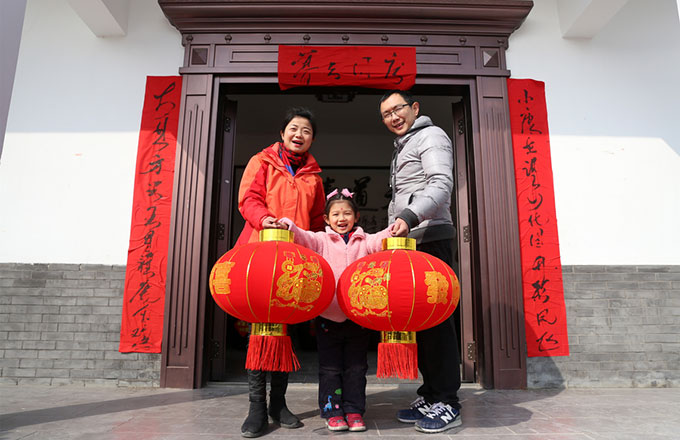Communities help vulnerable drug addicts from relapsing
It has been a long time since recovering heroin addict Zhang Lin has felt part of a community. A user since 1998, he has spent the last decade in and out of State-run rehab centers.
His ongoing battle with drugs has cost him his marriage and most of his friends.
 |
|
Recovering drug addicts do manual work at Zhiyuan rehabilitation center in Beijing's Shunyi district in July 2010. The center helps former addicts learn a trade or a skill that will enable them to make a living. Zhang Yujun / for China Daily |
"Last year, at Chinese New Year, I was desperate and alone. I felt forgotten," the 53 years old said, recalling the time after his last stint at the Beijing Drug Rehabilitation Center.
But things have changed, he said, thanks largely to the Sunflower Community project.
Jointly run by the public security bureau in Beijing's Dongcheng district and residential committees, the pilot program aims to reduce relapses among reformed addicts through community supervision, as required in a 2008 revision of the Drug Control Law.
Roughly 100 people in Dongcheng district have joined the three-year program since June 2011. It is compulsory for addicts fresh out of rehab, but they must first sign agreements with community committees. Each receives access to social services and must pass regular urine tests — once a month for the first year, every three months for the second and every six months for the third.
So far no community has reported a positive test, according to the Dongcheng public security bureau.
Drug control officer Xing Tao, who regularly calls and visits addicts in the program to check on their progress, said the Sunflower Community program is ready to be rolled out across the capital.
"We don't have clear statistics on how many people re-offend after they are released from rehab centers, but we're certain that the program can ease the severity of the problem," he said.
Community care
Zhang, one of 10 recovering addicts supervised by the Andingmen community, signed up for the program in early 2012. Hao Shuhua, director of the residential committee of the community, said Zhang was unemployed at that time and lived on a monthly government allowance.
His wife had left him about five years earlier, and his young son had been sent to live with the child's mother, "so he was idle much of the time", Hao said. She began by encouraging him to find a job.
"Most drug users don't like sharing their stories and are seldom willing to talk about their difficulties," said Hao, who has six years' experience in community social work. "The first thing we need to do is win their trust and get them to open up."
Zhang's breakthrough came when Hao and her colleagues visited his father, who was gravely ill in a hospital. "He became more talkative after that, and he turned to me when he was in trouble," she said.
Zhang now runs a small booth selling pancakes.
In contrast to the loneliness of last year, he said this Spring Festival he received a gift of a bag of flour and a tub of cooking oil from the committee.
"I was so happy," he added. "I didn't expect anyone would ever care about me again."
Some cases are more difficult than others. Another recovering addict in the community, whom Hao identified only as Jin, had until recently consistently refused to sign up for the program.
"He would just shout at us or would fail to turn up to appointments," she said. "It was awkward. The agreement is compulsory, so all we could do was keep visiting his home and getting the rehab officers to contact him and try to change his mind."
They eventually succeeded, she said, but only after turning up at Jin's home during the National Day holiday with gifts for his daughter.
Long road ahead
Sunflower Community is just one of the projects nationwide based on requirements set out in the 2008 law revision. Guizhou province officials have launched a program that helps former drug users find full-time work.
For police and drug-control experts, the efforts are a major step forward in the global fight against narcotics. Beijing police alone handled more than 1,400 drug-related cases last year, detaining more than 1,400 suspects and seizing about 50 kilograms of narcotics.
"Drug addicts are patients too. We can't just punish them, we need to treat them," said Li Wenjun, a professor at the People's Public Security University of China.
Community support reinforces the work done in rehab centers, she said.
"With help finding job opportunities and gaining work skills, addicts can re-enter society. Plus, an addict is more likely to accept help from neighbors," Li said, adding that many were reluctant to accept help from police or court officials.
However, Chen Shuaifeng, a drug control expert at the university, said he feels community programs in China fall far short of what is needed to help more addicts stay clean.
"Many drug users simply refuse to sign up for these compulsory agreements, and some communities are failing to develop relationships with them," he said. "It's not practical to solve the problem this way."
According to Chen, even after time in a rehab center and with community support, more than 90 percent of addicts will go return to drugs.
"We need to focus more on giving them psychological and emotional help," he said. "That's the key."
Song Zhandong, a staff member at the Beijing Drug Rehabilitation Center who helps out with the program in Andingmen community, said many kinks still need to be ironed out in community workers' procedures.
He cited an example in which a colleague called a 30-year-old resident in the program to remind him about a forthcoming drug test. Unfortunately, he did not know the man was at work.
"His boss, previously unaware of his employee's drug problem, overheard the conversation and fired him on the spot," Song said. "The guy was furious with us for a long time. Up until then, he'd cooperated with us well, but that changed things."
The situation only improved after the office helped the man find a new job.
Community leader Hao said the case also made her rethink how to approach her work with recovering addicts.
"After all, they are in a more sensitive situation than ordinary people," she added. "We need to be more understanding."
caoyin@chinadaily.com.cn

























